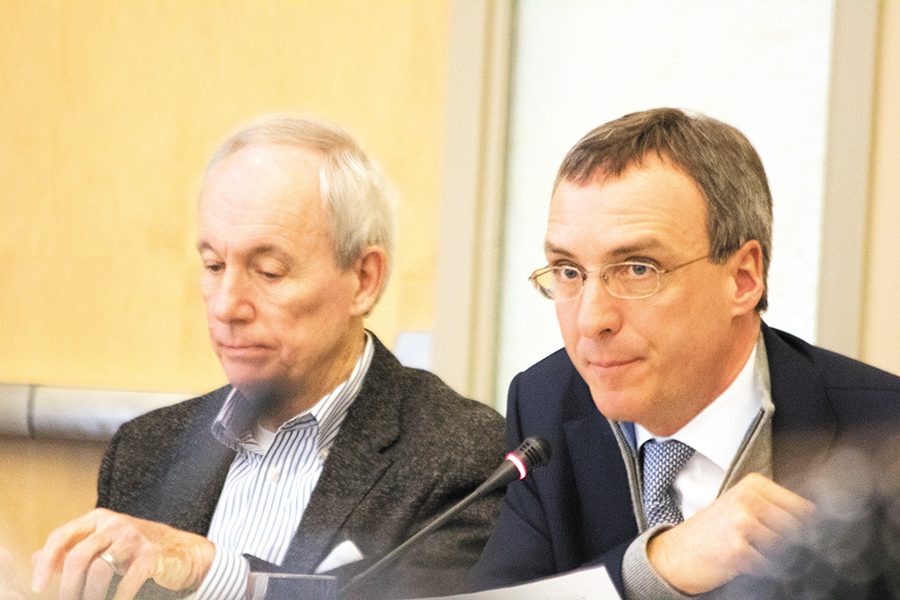Faculty concerned over presidential search transparency
Chair of the board of trustees David Daigle and President Tom Sullivan speak at the final session of the board of trustees meeting Feb. 2. Campus leaders, including SGA President Ethan Foley and Joseph Campbell, Graduate Student Senate President, confronted decisions to determine the future of the University.
February 5, 2019
Faculty are expressing concerns over the presidential search process after it yielded just a single public finalist.
The “sole finalist” is Dr. Suresh Garimella, executive vice president for research and partnerships at Purdue University.
Garimella will be on campus Feb. 13 to 15 for meetings and open forums as the public part of the search process, according to a Feb. 4 email from David Daigle, co-chair of the presidential search committee.
After the visit, he will need to pass approval by the board of trustees to be appointed as president. If he is not approved, the search process will begin again, Daigle said.
In past searches, the private process has resulted in about three candidates who then compete publicly for the presidency through interviews with various groups on campus, United Academics President Sarah Alexander said.
In contrast, this year’s presidential search used more time behind closed doors, which surprised and concerned faculty at the University, Alexander said.
“I’m receiving scores of email from concerned faculty,” Alexander said. “We’re mostly concerned about process at this point.”
Daigle said the committee did not reveal the identities of the candidates in order to attract strong candidates who didn’t want their current institutions to know they were shopping around at other universities.
“These are individuals that are in very high profile leadership positions at other academic institutions and this would affect their careers if they were announced as finalists in this process,” Daigle said. “We could have ended up with three or four finalists who were all willing to go public. That is not what happened in our case.”
Alexander said many faculty members disagree with the decision to prioritize the candidates’ needs.
“We feel the need to protect the privacy of the candidates came at the expense of faculty and student input,” Alexander said. “It demonstrates a failure to commit to student governments.”
The shift towards a more private search process is not unique to UVM, Daigle said.
“This has been an evolution in university searches, particularly presidential searches, where the old model of ‘have an extended open, competitive, public phase’ is something that is not as popular,” Daigle said. “The direction of these searches is to go with a more extended private phase.”
While the position is not guaranteed for Garimella at this point, he would not have been announced unless the search committee was confident in the strength of his candidacy, Daigle said in an interview with the Cynic.
“Moving forward with [Garimella] as the sole finalist had nothing to do with the fact that he himself was willing to be part of a public process,” Daigle said.
SGA President Ethan Foley, a junior, expressed disappointment at the search process. He was told SGA and other student groups would have a chance to speak with finalists, but was informed later in the process the plan had changed.
There is one undergraduate student serving on the presidential search committee, junior Xavier Giddings.
“There should have been more student input directly from the SGA represented on the committee,” Foley said. “There could have been and should have been more than one undergrad on the committee.”
Foley and SGA are looking to make a more student-centered search process for the next presidential candidate following the conclusion of this search, he said.
Although SGA submitted documents with student input about what they wanted in a president at the start of the process, their involvement concluded after this submission and a discussion with the search firm Witt Kieffer, which the University hired to assist in the search process.
“We can’t change what has already happened. Instead, we need to work on a strategic plan for students and a diverse and inclusive committee with a clear, laid-out process going forward with all governance groups in the know,” he said.
The board’s leadership profile for the new president included a record of advancing academic excellence, an ability to strengthen financial support for the university, a history of organizational leadership and accomplished in creating an inclusive environment, according to the Feb. 4 email.
Garimella is the Goodson Distinguished Professor of mechanical engineering and served as the Chief Global Affairs Officer and as an Associate Vice President for Engagement at Purdue, according to the email.
The US Department of State appointed Garimella as a Jefferson Science Fellow and served for six years as a senior fellow in the State Department’s Energy and Climate Partnership of the Americas, amongst other awards and honors.
Garimella is the co-author of more than 500 publications and 13 patents, according to the email. He earned his bachelor’s degree from the Indian Institute of Technology Madras, his M.S. at the Ohio State University and his Ph.D. from the University of California Berkeley, according to the email.
This story updated at 1:41 p.m. Feb. 5 to include comment from SGA President Ethan Foley.







